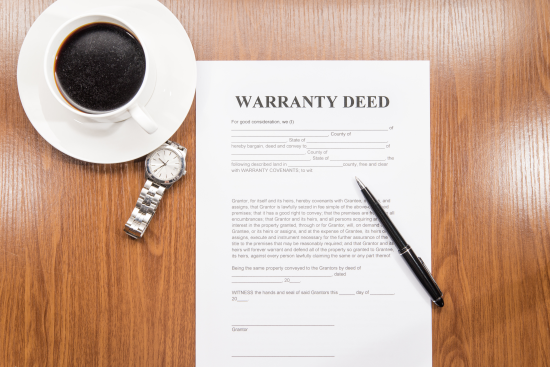Understanding the different types of deeds that transfer property
ownership is crucial when dealing with real estate transactions in Miami. Among
the various deeds you'll encounter, the Warranty Deed and the Quit Claim Deed
(QCD) stand out for their distinct features and uses.
Each deed serves a unique purpose and offers varying levels of protection and guarantees, making it essential to comprehend their differences and similarities to make informed decisions in property transfers.

What’s a Warranty Deed?
Imagine you’re buying a charming Kendall single-family home. The seller gives you a Warranty Deed, which is like a promise that the
property’s title is clean. This means they’re guaranteeing that no one else has
a claim to the property and there are no hidden liens or legal issues.
To obtain a Warranty Deed in Florida, it is advisable you consult with a real estate attorney or a closing agent to ensure all legal requirements are met. They will conduct a title search to verify the property's title is clear of any liens or claims and will draft the deed.
Both the buyer and seller must sign the deed in the presence of a notary public. Once signed and notarized, the deed must be recorded with the county recorder's office to make the transfer official and public. Normally, you'll receive the recorded Deed by mail from your closing agent or attorney.
Here’s
what you get with a Warranty Deed:
1. Covenant of Seisin: The seller assures you they own the
property and can legally sell it.
2. Covenant Against Encumbrances: The property is free of
any hidden liens or claims, except those noted in the deed.
3. Covenant of Quiet Enjoyment: You won’t be disturbed by
anyone claiming a better title to the property.
4. Covenant of Warranty Forever: The seller will defend the
title against any claims forever.
In essence, a Warranty Deed gives you peace of mind that
your new Kendall home is legally yours, free and clear.
What’s a Quit Claim
Deed?
Now, let’s say you’re transferring ownership of a family home in the
Kings Creek neighborhood from one relative to another. A Quit Claim Deed might
be used here. This type of deed transfers whatever interest the seller (or
giver) has in the property without making any guarantees. The seller simply
“quits” any claim to the property.
For a Quit Claim Deed, the process is somewhat simpler but still benefits that you obtain professional oversight to ensure accuracy. The person giving the property (grantor) and the person receiving it (grantee) need to sign the deed in front of a notary public.
After notarization, the deed should be recorded with the county recorder's office to finalize the transfer. While a Quit Claim Deed does not guarantee that the title is clear or that the you own the property outright, recording the deed is essential to make the transfer legal and public.
Here’s when a Quit Claim Deed might come
into play:
1. Family Transactions: Like transferring property between
family members.
2. Divorce Settlements: One spouse transfers their interest
in a property to the other.
3. Clearing Title Issues: Correcting errors in the title.
Unlike a Warranty Deed, a Quit Claim Deed doesn’t promise you own the property or that it’s free of legal issues. It just
transfers whatever interest you have.
Deciding Between a Warranty Deed and a Quit Claim Deed
Figuring out which deed to use in Miami real estate transactions depends on the type of property deal you have. For most standard home purchases, like a dream house in Kings Creek single-family subdivision, a Warranty Deed is your best bet because it offers the most protection. On the other hand, if you’re transferring a property informally, like a Dadeland condo, a Quit Claim Deed might be sufficient.
It’s always a good idea to consult with a real estate
attorney or expert to ensure you’re making the best choice for your specific
situation.
Understanding the ins and outs of Warranty and Quit Claim
Deeds can help you navigate the Miami real estate market with confidence,
making your transactions smoother and more secure.
*Disclaimer: This article is intended for informational
purposes only and does not constitute legal advice. Consult with a professional
for legal guidance specific to your situation.
About the Author: Liz Kenneally is a seasoned real estate agent in Miami with extensive experience in the city's dynamic market. Specializing in coveted neighborhoods such as Coral Gables, Dadeland, Continental Park, East Kendall, Palmetto Bay, Pinecrest, South Miami, and The Falls, Liz ensures smooth transactions for her diverse clientele. Fluent in both English and Spanish, she can be contacted at 786-423-3348 or through the EMAIL AGENT form provided alongside this blog.